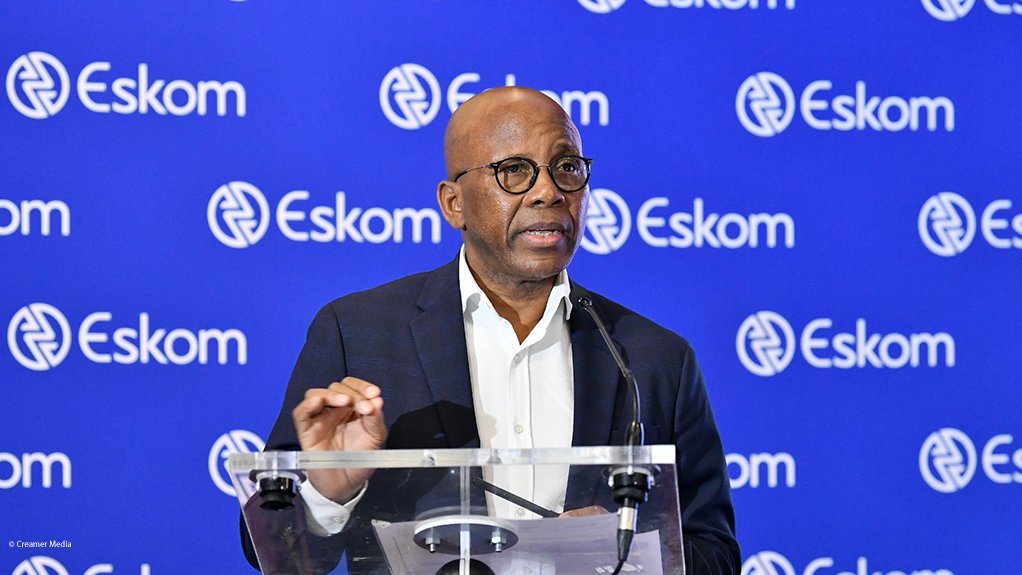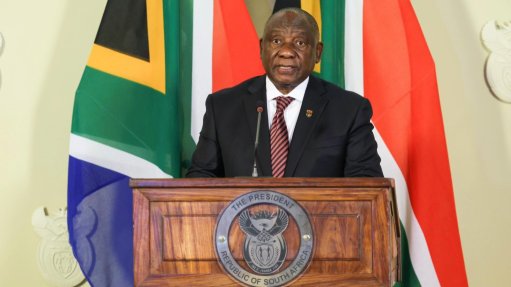Eskom identifies role for itself in future electricity ecosystem
State-owned power utility Eskom has identified a set of roles it could and should operate in to support the transition of the electricity environment to include more sustainably-generated electricity.
Specifically, Eskom chairperson Dr Mteto Nyati, during a briefing on September 5, said that the utility would participate in the renewable energy generation space and aimed to “be assertive, as this is a space we feel we should be able to occupy”.
Additionally, Eskom group CE Dan Marokane pointed out that Eskom also aimed to play a role in balancing the grid and ensuring its stability as more renewable energy would add variability.
“Our gas-to-power project is important for this role. We are busy with work on our gas-to-power project in Richards Bay and are awaiting the outcome of our environmental-impact assessment for it.”
Moving into planning for the latter part of the new electricity ecosystem, Eskom would monitor the impact of the variability of renewable-energy generation to see how it could use its coal-fired stations to ensure grid stability.
“We also remain committed to converting our existing open-cycle gas turbines to run on gas and not diesel,” he added during the company's Summer Outlook briefing.
As South Africa added more capacity from independent power producer programmes and from private generation, it was important to shine the spotlight on grid stability, he said.
Additionally, he added that Eskom would have sufficient capacity to meet demand, if national growth picked up to 2% a year.
The company predicted that it would have sufficient capacity if this were to happen until its 2031 financial year, which was when its additional new generation capacity was set to come online.
“We are confident that we have a role to play in the reformed electricity industry going forward. We are embedding reforms in our organisation and positioning ourselves to exist in a competitive market by taking advantage of our own capabilities,” Marokane said.
For long-term sustainability, the business had to be able to exist in an environment in which tariff increases were low. Eskom was planning for an environment of single-digit yearly increases in tariffs and this required the organisation to continue to look for cost savings, he noted.
The company is aiming to address all three aspects of the energy trilemma, namely energy security, affordability and sustainability.
“As part of our strategy, we are pivoting to address these three aspects over the next few years. We aim to ensure South Africans are protected from the unintended consequences of the energy transition and we emphasise the importance of a controlled and rules-driven transition.
“This rules-based approach will ensure that the environment into which we are moving is predictable and provide the confidence for investors, as everyone will know the lay of the land,” said Marokane.
Further, Electricity and Energy Minister Dr Kgosientsho Ramokgopa added that the State would continue to use Eskom as the vehicle to provide electricity to poor citizens.
“We are entering a new era and dispensation. We have embedded the reforms that will be part of the complete remake of the electricity value chain in the country.
“These reforms are irreversible. As we are in the nascent stages of this transition, there is friction between players, but the transition will continue and the reforms will also address the provision of electricity to the poor,” he said.
Eskom is on the cusp of ending loadshedding completely and had addressed structural loadshedding, having implemented only 26 hours of loadshedding during the winter months, which had been caused by a technical fault.
“Now, we are looking for sufficient headroom to get the economy to grow at 2%, or more, a year. Reliable and affordable electricity must lead the country's growth,” said Ramokgopa.
Additionally, the Minister said the price of electricity was untenable and households were finding it difficult to keep up with large yearly tariff increases that eroded disposable income and made companies uncompetitive.
“We are revising the electricity pricing policy and the intention is to conclude this by the first half of next year,” he said.
Eskom had heard that South Africa considered its electricity expensive, and would have to manage costs within single-digit increases, Marokane said in response to questions.
It was meeting with suppliers to inform them of the need to manage costs within these increases, he added.
“The key concern is how to ensure that electricity pricing addresses the long-term aspects across society, including to provide electricity to poor and indigent households, to ensure households pay a reasonable cost for electricity, and to protect and power industries,” said Marokane.
Article Enquiry
Email Article
Save Article
Feedback
To advertise email advertising@creamermedia.co.za or click here
Press Office
Announcements
What's On
Subscribe to improve your user experience...
Option 1 (equivalent of R125 a month):
Receive a weekly copy of Creamer Media's Engineering News & Mining Weekly magazine
(print copy for those in South Africa and e-magazine for those outside of South Africa)
Receive daily email newsletters
Access to full search results
Access archive of magazine back copies
Access to Projects in Progress
Access to ONE Research Report of your choice in PDF format
Option 2 (equivalent of R375 a month):
All benefits from Option 1
PLUS
Access to Creamer Media's Research Channel Africa for ALL Research Reports, in PDF format, on various industrial and mining sectors
including Electricity; Water; Energy Transition; Hydrogen; Roads, Rail and Ports; Coal; Gold; Platinum; Battery Metals; etc.
Already a subscriber?
Forgotten your password?
Receive weekly copy of Creamer Media's Engineering News & Mining Weekly magazine (print copy for those in South Africa and e-magazine for those outside of South Africa)
➕
Recieve daily email newsletters
➕
Access to full search results
➕
Access archive of magazine back copies
➕
Access to Projects in Progress
➕
Access to ONE Research Report of your choice in PDF format
RESEARCH CHANNEL AFRICA
R4500 (equivalent of R375 a month)
SUBSCRIBEAll benefits from Option 1
➕
Access to Creamer Media's Research Channel Africa for ALL Research Reports on various industrial and mining sectors, in PDF format, including on:
Electricity
➕
Water
➕
Energy Transition
➕
Hydrogen
➕
Roads, Rail and Ports
➕
Coal
➕
Gold
➕
Platinum
➕
Battery Metals
➕
etc.
Receive all benefits from Option 1 or Option 2 delivered to numerous people at your company
➕
Multiple User names and Passwords for simultaneous log-ins
➕
Intranet integration access to all in your organisation





















